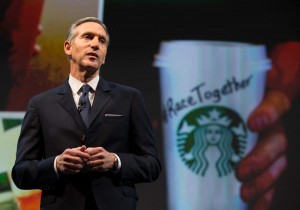The coverup is worse than the crime. That is one of the foundational principles of reputation management.
Starbuck’s “Race Together” campaign came to an abrupt end on Sunday – a few days after it was savaged in the Twitter-verse – to the point that the company’s Chief of Global Communications quit Twitter – temporarily.
Howard Schultz said the coffee-cup scribbling strategy to bridge the nation’s racial divide came to an end “as planned.” To be honest, I can’t help but doubt that – and it will be interesting to see whether that story sticks.
Either way, this was a classic case of what you might call “executive lever pulling” gone awry.
Everybody “in charge” of something wants to leave a mark, to do something impactful, to break out of the brand’s “space” with a well-received explosion of creativity and possibly a dash of edginess.
Frequently however, that lever pulling fails miserably – even if conceived by the likes of Howard Schultz who is widely considered to be a good cat – outside of the whole Sonics thing.
We’ve all suffered the big “idea guy” executive whose best offering is to change the logo, or build yet another strategic plan. I don’t put Schultz into that category, but this whole Race Together thing proves even the best aren’t beyond hubris, and a pride that results in an over-trusting of the proverbial “gut” – that always seems to tell them that whatever they’re doing will be a hit.
I think the real story however lies behind the Race Together debacle. It’ s the internal story. Was there an attempt by internal stakeholders to put a stop to the grand crusade? Did anybody pitch doing some focus groups? How about polling the idea? I don’t suggest we let polling rule our decision-making, I do however suggest that valid and properly designed research be conducted to prevent outright PR disasters.
Maybe the crew did all they could to vet the idea and they weren’t heard. Or possibly this was just a case of the CEO marching downstairs one day and making a declaration: assured of the rightness of his action, the trustworthiness of his gut, and the power to translate the affinity for a high-priced status-driven product into needle-moving action in relation to an intractable social problem.
Sheesh. When you put it that way, it DOES sound easy!
Frankly, I would like to know that back story. I am just about positive it will make a heckuva”’ “Here’s what really happened” deep write-through in a magazine like Salon or The Atlantic someday. And yes Global Communications Poobah, that story will come out – it will be well-sourced – and it will be dishy – so save yourself the grief and get out in front of it now.
That however, is just my gut.









